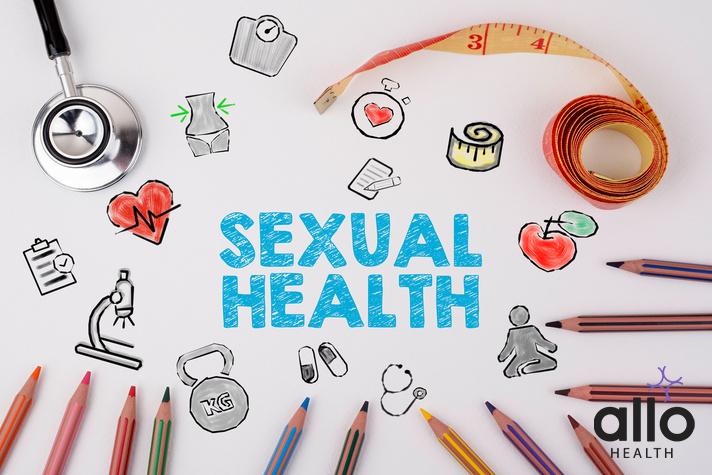Sexual Health Across The Lifespan

Allo Health is dedicated to personalized well-being, offering support and trusted information tailored to individual health goals. The platform emphasizes human-generated content, led by a distinguished medical team of experts, including physicians and sexual health specialists. Their commitment to credibility involves rigorous fact-checking, authoritative research, and continuous updates to ensure accurate, up-to-date information. Allo Health's unique approach goes beyond conventional platforms, providing expert-led insights and a continuous commitment to excellence, with user feedback playing a crucial role in shaping the platform's authoritative voice.

Dr Sanina Mansoor holds MBBS degree from Yenepoya university,Mangalore.She has 8 years of experience working as a medical officer at various health centres and medical colleges.
Why This Was Upated?
Our experts continually monitor the health and wellness space, and we update our articles when new information became available.
Updated on 10 February, 2025
- Article was updated as part of our commitment to diversity, equity, and inclusion.

"The following blog article provides general information and insights on various topics. However, it is important to note that the information presented is not intended as professional advice in any specific field or area. The content of this blog is for general educational and informational purposes only.
Book consultation
The content should not be interpreted as endorsement, recommendation, or guarantee of any product, service, or information mentioned. Readers are solely responsible for the decisions and actions they take based on the information provided in this blog. It is essential to exercise individual judgment, critical thinking, and personal responsibility when applying or implementing any information or suggestions discussed in the blog."
Sexual health is a vital component of overall well-being, yet it is often overlooked or stigmatized. Understanding and maintaining sexual health is important at every stage of life, from adolescence to older adulthood. Each life stage brings unique challenges and changes, making it essential to adapt and address sexual health needs accordingly. This article explores sexual health across the lifespan, highlighting key aspects and considerations for each age group.
Adolescence: Navigating Puberty And Sexual Awareness

- Adolescence is a critical period for sexual health as individuals undergo significant physical, emotional, and social changes. Puberty marks the beginning of sexual maturity, characterized by hormonal changes that lead to the development of secondary sexual characteristics, such as breast development in girls and voice deepening in boys. These changes often spark curiosity and exploration of sexuality.
- Education during this stage is crucial. Adolescents need accurate information about their bodies, sexual function, and safe sexual practices. Comprehensive sex education can help prevent sexually transmitted infections (STIs) and unintended pregnancies. It is also a time to instill values of consent, respect, and healthy relationships.
- Parents and guardians play a pivotal role in guiding adolescents through this period. Open, honest communication can foster a supportive environment where young people feel comfortable seeking advice and discussing concerns about their sexual health.
Young Adulthood: Establishing Sexual Identity And Relationships
- Young adulthood is a time of exploration and establishment of sexual identity and relationships. Individuals in their late teens to early thirties often engage in more consistent sexual activity and form long-term partnerships. This stage is marked by a heightened sense of independence and personal responsibility.
- For many, this period involves navigating sexual orientation and gender identity. It is important to recognize and support diverse sexual identities, providing resources and safe spaces for LGBTQ+ individuals. Access to sexual health services, including contraception and STI testing, is essential to promote safe sexual practices and prevent health issues.
- Building healthy relationships is another key aspect of sexual health in young adulthood. This involves communication, mutual respect, and consent. Addressing issues such as consent, sexual boundaries, and intimacy can help establish a foundation for positive sexual experiences and relationships.
Midlife: Maintaining Sexual Health Amidst Life Changes

- Midlife, typically defined as the period between the ages of 40 and 65, brings a host of changes that can impact sexual health. Many individuals in this stage are managing career responsibilities, parenting, and the onset of age-related health concerns. These factors can influence sexual desire and function.
- For women, menopause is a significant milestone that affects sexual health. The decline in estrogen levels can lead to vaginal dryness, decreased libido, and other symptoms that impact sexual comfort and satisfaction. Hormone replacement therapy (HRT) and other treatments can help alleviate these symptoms and improve sexual well-being.
- Men may experience changes in erectile function, often related to declining testosterone levels or other health conditions such as cardiovascular disease or diabetes. Addressing these issues with a healthcare provider can lead to effective treatments and improved sexual function.
- Maintaining open communication with partners about sexual needs and concerns is vital during this stage. Exploring new ways to connect and maintain intimacy can help sustain a healthy sexual relationship.
Older Adulthood: Embracing Sexuality In Later Life
- Sexual health remains important in older adulthood, even as physical and emotional changes continue. Many older adults remain sexually active and find that sexual intimacy continues to be a source of pleasure and connection.
- Age-related changes can impact sexual function, but they do not eliminate the potential for a fulfilling sex life. For example, women may experience changes in vaginal elasticity and lubrication, while men may encounter challenges with erectile function. Medical treatments, lubricants, and other interventions can help address these issues.
- Older adults should also be aware of the risk of STIs. With the rise in divorce and new relationships in later life, it is crucial to practice safe sex and get regular health check-ups.
- Emotional intimacy and companionship become increasingly significant as physical changes occur. Fostering strong emotional bonds can enhance the sexual experience and overall relationship satisfaction.
Sexual Health Considerations For All Ages
Regardless of age, certain principles of sexual health apply universally:
- Communication: Open, honest dialogue about sexual needs, preferences, and concerns is essential for a healthy sexual relationship. Effective communication can prevent misunderstandings and enhance intimacy.
- Education: Continuous education about sexual health is important at every stage of life. Staying informed about safe sexual practices, consent, and available resources can promote better sexual health outcomes.
- Healthcare Access: Regular visits to healthcare providers for sexual health check-ups, screenings, and treatments are crucial. Access to sexual health services can prevent and address issues such as STIs, sexual dysfunction, and reproductive health concerns.
- Mental Health: Mental and emotional well-being significantly impact sexual health. Addressing issues such as anxiety, depression, and stress can improve sexual function and satisfaction.
- Consent and Respect: Respecting boundaries and obtaining consent are fundamental to healthy sexual interactions. Understanding and practicing these principles fosters a safe and respectful sexual environment.
Sexual health is a lifelong journey that evolves with each stage of life. From adolescence to older adulthood, maintaining sexual health requires adapting to physical, emotional, and social changes. By prioritizing education, communication, healthcare access, and respect, individuals can navigate these changes and enjoy fulfilling sexual relationships throughout their lives. Recognizing the importance of sexual health across the lifespan ensures that this vital aspect of well-being is nurtured and valued at every age.








































